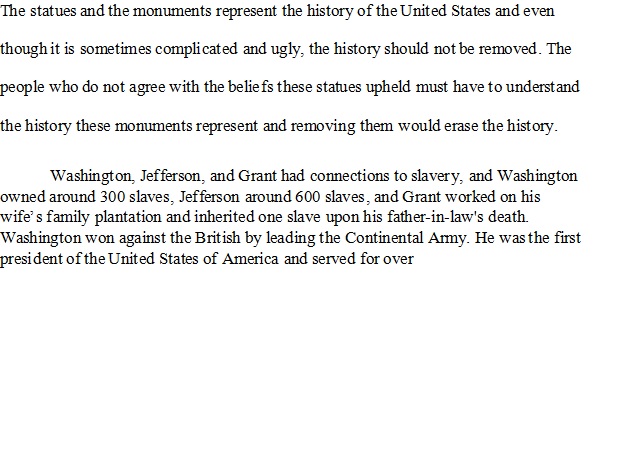


Q The debate surrounding monuments which memorialize prominent Confederate individuals is not new, though we have certainly seen it take on significantly more relevance following the shooting of 9 innocent people at the historic Emanuel AME church in Charleston, SC by the racist Dylann Roof several years ago, and now with the death of George Floyd at the hands of Minneapolis police officers. This issue has now extended beyond just Confederate monuments however, as people have now demanded removal of monuments to Christopher Columbus, changing the names of several military bases named after prominent Confederate men, and even whether or not the University of Texas should change it's fight song "eyes of Texas", or at the very least not require athletes to participate in singing it given the racist undertones associated with the origins of it. The purpose of this question is to explore how Texas, and indeed the rest of the nation, is to deal with the monuments erected to memorialize men who find themselves on the wrong side of history due to their positions on slavery and racism. On the one side, there are those people who point to the actions of Dylann Roof and the protests which rocked Charlottesville, VA where those in favor of protecting Confederate monuments and keeping them in the public square clashed with counter-protesters, eventually leading to the death of Heather Heyer when she was run down by a vehicle driven by a white supremacist. This scene has been played out many times in the past and recently engulfed the entire nation after the death of Mr. Floyd. As a result of these tragedies, along with others not named, the call for the removal of these monuments has sounded like a clarion call across the country and many states have reacted by removing various monuments. Others have called for the statues to remain, with some supporting keeping the monuments because they support the more extreme racist ideologies, and others calling for them to remain due to their historical significance as they argue that removing the monuments equates to erasing or ignoring history. Pres. Trump received a significant amount of criticism for his response to these issues, including speaking of a "slippery slope" by asking if these monuments are allowed to be removed, then where would it stop? What about historic figures such as George Washington? Should monuments to Washington be removed due to the fact that he owned slaves Pres. Trump asked? The president's question was widely panned as ridiculous, though it is worth noting that a plaque at the church that Washington attended was removed due to some in the church claiming that they felt unsafe going to a church where Washington was commemorated due to the fact he had owned slaves. Is this the slippery slope that Trump warned of? What is Texas and the rest of the nation to do in response to a history that is complicated and at times, quite ugly? Should monuments be removed and never seen again? Should they remain and have plaques or some other way of putting into context the uglier parts of the history as it relates to these individuals? Should they be preserved because they are historic, but put in a place such as a museum where people can see them and learn about all of the history, both good and bad, behind the monuments? Should only monuments memorializing the confederacy be dealt with, or should all monuments which involve people once connected to the issue of slavery and racism be considered fair game, including those of famous figures such as George Washington? Please tread carefully on this topic and be respectful of each other. We are all adults here and should be able to handle discussing complex and relevant issues such as this which face our state and nation, but I will absolutely not tolerate any sort of bullying, racist language/behavior, or harassment of others based upon the views. Anyone who violates this requirement will be dealt with severely via their course grade, and depending on the severity of the violation, further sanctions by the college. I believe we are all capable of having a civil discourse on this issue, but please keep the discussion to the issue of the monuments and attempt not to turn the discussion into one on the broader issues of race and equality (though these issues are certainly a part of the larger argument), as these are far too complex for any discussion board to adequately address. As always, make sure that you use at least one source to support your position, and make sure that you respond to at least one classmate as well (respectfully of course). I look forward to reading your thoughts on this complex issue, and to seeing if you all are able to come up with a fair solution which has evaded so many in our government and nation.
View Related Questions